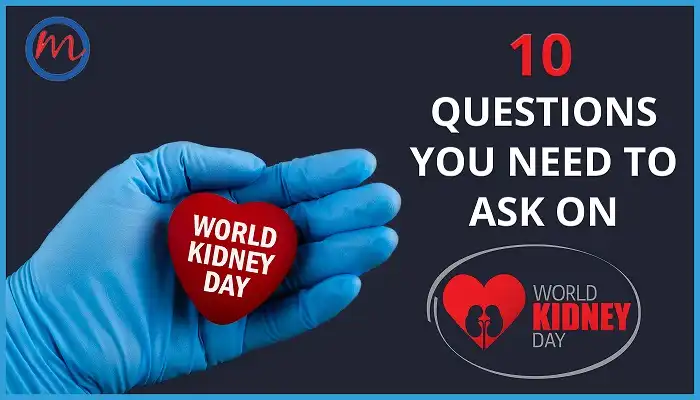March 11 is World Kidney Day. Celebrated since 2006, it’s a day to drive home the message that kidney disease is common, harmful and treatable. It’s also a day to keep in mind that people with diabetes are at the highest risk of developing chronic kidney disease and failure.
Consider the stats: 1 in every 10 people across the world are affected by chronic kidney disease (CKD), and about 20–40 percent of them have diabetes, according to the World Health Organization. Put in another way, about 1 out of 3 adults with diabetes has kidney disease.
India faces a surge in kidney disease: four lakh Indians suffer from CKD, with two lakh new cases of end-stage kidney disease each year. The hard truth is: nearly 50 percent of those suffering from kidney failure have diabetes, reports the Indian Medical Association.
With nearly 77 million people living with diabetes in India, according to data from the International Diabetes Federation, the implications are staggering. That’s why let’s take this opportunity to clarify all the questions you are likely to have:
1) How do the kidneys work?
Bean-shaped and the of the same size as your clenched fist, your two kidneys lie on either side of your body, above the waist. Their main is to filter wastes and extra water out of your blood to make urine. In fact, they filter around 180 liters of blood every day. That’s not all: the kidneys also control the production of red blood cells and release hormones that regulate your blood pressure. In addition, the kidneys help keep your bones healthy by helping produce an active form of vitamin D. When the kidneys get damaged, wastes build up in your body, causing a range of health problems. Kidney damage from diabetes usually occurs over many years.
2) What are the ‘high risk’ factors that should alert you to the possibility of kidney disease?
i) you have diabetes
ii) you have hypertension (high blood pressure)
iii) you have obesity
iv) you have a family history of kidney disease
3) How many people with diabetes will develop kidney disease?
About 30 percent of people with Type 1 diabetes and 30 to 40 percent with Type 2 diabetes eventually, suffer from kidney at any given time comprehensive. In India, however, it is estimated to affect 50 percent of all people with diabetes.
4) What else is diabetic kidney disease called?
– DKD (Diabetic kidney disease)
– CKD (Chronic kidney disease)
– Diabetic nephropathy
5) What are the symptoms of kidney disease, especially in people with diabetes?
Most cases of chronic kidney disease show no symptoms as it develops, hence often goes unnoticed and untreated. Some of the typical symptoms are:
– You lack energy, you feel weak, you are tired, have trouble concentrating (from the buildup of toxins and impurities in the blood, when the kidneys don’t function properly. Another complication is anemia, which can cause weakness and fatigue.)
– You have a poor appetite, feel nauseous(from the buildup of toxins)
– You get muscle cramps
(from electrolyte imbalance due to impaired kidney function. Low calcium levels and poorly controlled phosphorus often cause muscle cramping)
– High Blood Pressure
(uncontrolled high blood pressure over time make the arteries around the kidneys narrow, weak or hard. When this happens, the kidneys can’t remove all wastes and extra fluid from the body. Extra fluid in the blood vessels raises your blood pressure, even more, creating a dangerous cycle.)
– Using the bathroom more at night
(a sign of damaged kidneys filters)
– Shortness of breath
(water retention in the lungs)
– Frothy, cloudy urine, with excessive bubbles
(indicate protein in the urine, an early sign that the kidney filters are damaged, allowing the protein to leak out, rather than keeping it in the body)
– Puffy eyelids
(can be from protein being leaked out in the urine, rather than keeping it in the body.)
– Dry and itchy skin.
(a sign that the kidneys are unable to keep the right balance of minerals and nutrients in your blood)
– Troubled sleep.
(When the kidneys don’t filter properly, toxins stay in the blood, making it difficult to sleep. Sleep apnea is more common in those with chronic kidney disease)
– Weight gain
(When the kidneys function poorly, fluid builds up in the tissues, causing water weight gain, not fat or muscle.)
– Your ankle and feet are swelling
(impaired kidney function can lead to sodium retention, causing swelling)
– Blood in your urine.
(when the kidney’s filters are damaged; blood cells can leak out into the urine)
6) What does diabetes do to the kidneys?
Diabetes damages the kidneys in many ways: first, it affects the tiny blood vessels inside the filtering units of the kidneys. Over time, high sugar levels in the blood can cause these vessels to become scarred and clogged, reducing blood flow. Without enough blood, the kidneys get damaged.
Diabetes can also damage the nerves of the urinary bladder. As a result, the crucial messaging system between your bladder and your brain gets disrupted. As a result, you may not be able to feel when your bladder is full. The pressure from a full bladder can damage your kidneys.
If urine stays in the bladder for long, you may get a urinary tract infection—as germs grow rapidly in urine, especially when there is a high sugar level. Most often these infections affect the bladder, but they can sometimes spread to the kidneys.
7) What can you do to prevent kidney disease?
The most important task is to control your diabetes well. About half of people who have diabetes do not know they have diabetes. You need to check your blood sugar level, as part of a general body checkup, especially if you are approaching middle age.
If you already have diabetes, control your blood glucose with diet, exercise, and, medicines, whenever needed. Follow your daily monitoring of blood sugar at home, as well as regular A1C lab tests to get your average blood sugar levels over 6 to 8 weeks and keep it below 7%.
Maintaining blood pressure is also crucial. Most people who have high blood pressure are not aware of it. Hence, check your blood pressure as part of your general body checkup. High blood pressure, along with other factors like diabetes, high cholesterol and cardiovascular diseases. Do follow your doctor’s orders carefully regarding diet and medicines.
Follow a healthy diet to maintain ideal body weight, reduce blood pressure, prevent diabetes, heart disease and other conditions associated with kidney disease. Reduce your salt intake and for that limit the amount of processed and restaurant food. Optimize your fluid intake (normally, this means eight cups, approximately two liters per day.) Quit smoking, as smoking slows down the flow of blood to the kidneys. Smoking also increases the risk of kidney cancer.
8) How about the tests?
Although kidney disease develops without noticeable symptoms, the earliest sign is increased excretion of albumin in the urine. It is often recommended to have this test on a yearly basis. If you have diabetes, you should have your blood, urine and blood pressure checked at least once a year. Controlling your diabetes can lower your risk of developing severe kidney disease.
9) What about kidney failure?
You need to take note that there is no cure for kidney failure. If your kidneys stop working, you need treatment to replace the work of your failed kidneys: dialysis or kidney transplantation.
10) Are people with kidney disease at greater risk of Covid-19?
People with kidney disease (and other severe chronic medical conditions like diabetes) are generally at higher risk for more severe illnesses. People on dialysis can have weaker immune systems, making it harder to fight infections. Covid-19 is a new virus, and therefore research on it is ongoing. It seems, however, that older adults and people with kidney disease or other severe chronic medical conditions are at higher risk for more serious Covid-19 illness. Speak to your doctor and take necessary precautions as recommended.


